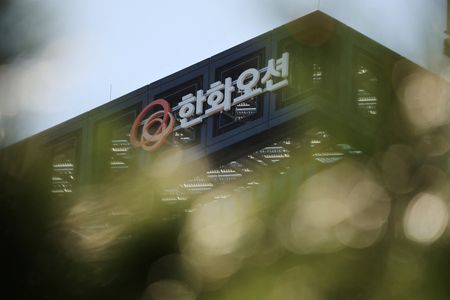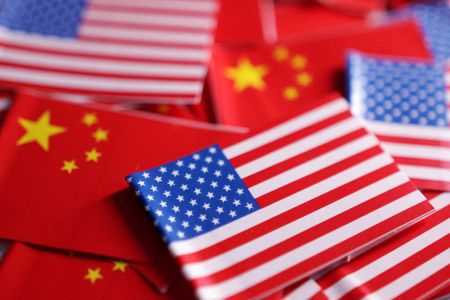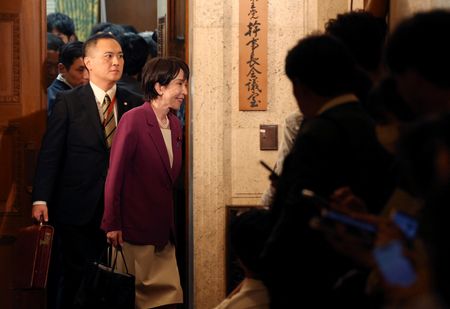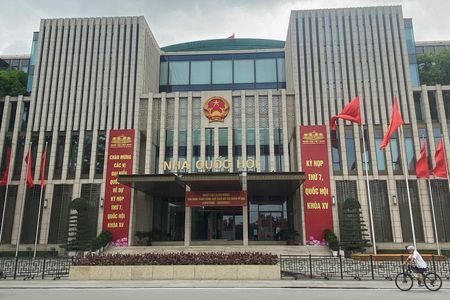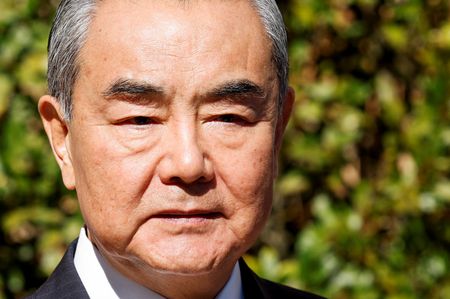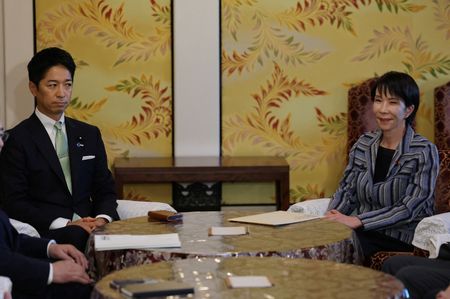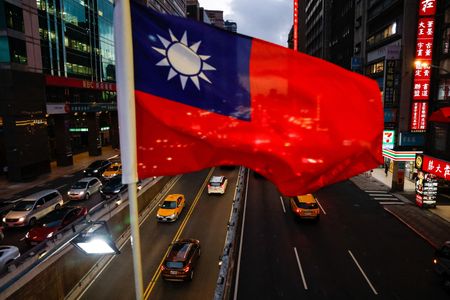By Hyunjoo Jin and Jack Kim
SEOUL (Reuters) -China’s sanctions on U.S.-linked units of shipbuilder Hanwha Ocean threaten to impact ambitious plans for shipbuilding cooperation between Seoul and Washington by disrupting supplies of Chinese equipment and materials, officials in Seoul said on Friday.
Beijing announced the sanctions on Tuesday as the U.S. and China began charging additional port fees on each other’s vessels, in the latest exchange in a protracted trade war ahead of a planned meeting of the two countries’ leaders.
South Korea has vowed to “Make America Shipbuilding Great Again” with a pledge of $150 billion of investment in the sector to help U.S. President Donald Trump’s push to revitalise American shipbuilding to catch up with China’s.
The decline of the U.S. shipbuilding sector and the industries needed to support it were such that it would be impossible to supply materials and parts from within the U.S., officials in Seoul said.
“There is bound to be an impact,” South Korea’s Minister of Defense Procurement Program Administration Seok Jong-gun said.
“I don’t see how we can make all the materials and supplies for Philly Shipyard within the U.S.,” Seok said in a parliamentary hearing on Friday.
“So if you’re going to get a lot of things to the U.S. from South Korea, and you have sanctions and all kinds of obstacles to doing that, I’d say there’s going to be an impact on MASGA eventually.”
Hanwha also runs a shipyard in China’s eastern province of Shandong that builds modules of ship components, a company filing showed. It supplies the modules to its shipyard in South Korea for the final assembly, according to the firm.
While analysts said the Chinese sanctions would not have an immediate impact, they added it may be a harbinger of tougher Chinese actions that could hit South Korean shipbuilders cooperating with the United States.
‘NOT SIMPLY A TRADE ISSUE’
South Korean lawmaker Yu Yong-weon estimated the Chinese sanctions would cost Philly Shipyard $60 million over the next two years. Yu did not give a breakdown of the estimate but cited likely disruptions of supplies to the shipyard and delayed delivery of vessels.
“This is not simply a trade issue but a grave matter that affects our economic security and industrial supremacy,” said Yu, adding he visited the shipyard last month.
Philly Shipyard, in Philadelphia, was bought by Hanwha last year and is one of five subsidiaries in the U.S. hit by the new Chinese sanctions.
Hanwha’s South Korean competitors, HD Hyundai and Samsung Heavy Industries, are eyeing projects envisioned for rebuilding U.S. maritime capabilities including work to build and maintain navy vessels.
Earlier on Friday, the U.S. State Department lambasted the Chinese sanctions as an “irresponsible” act that interferes with a private company’s operations and undermines South Korea-U.S. cooperation on revitalising U.S. shipbuilding and manufacturing.
“China’s actions … are the latest example in a long pattern of China’s attempts to coerce (South) Korea,” a spokesperson said in a statement to Reuters.
Hanwha Ocean declined to comment on the lawmaker’s claim on losses.
China’s Commerce Ministry banned transactions and cooperation with Hanwha Ocean’s U.S.-linked units, citing security risks stemming from what it said was their involvement in the U.S. government’s “relevant investigative activities”.
South Korea’s investment plan in the U.S. shipbuilding industry is the most concrete of pledges made to support a trade deal aimed at cutting U.S. import duties against South Korean goods.
(Reporting by Hyunjoo Jin, Jack Kim and Heejin in Seoul and David Brunnstrom in Washington; Editing by Chris Reese, Ed Davies and Muralikumar Anantharaman)

